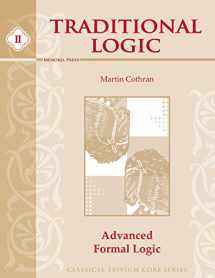
Traditional Logic, Book II: Advanced Formal Logic (Classical Trivium Core Series)
ISBN-13:
9781930953123
ISBN-10:
1930953127
Edition:
2000, student text
Author:
Martin Cothran
Publication date:
2000
Publisher:
Memoria Press
Format:
Paperback
144 pages
Category:
Pure Mathematics
,
Mathematics
FREE US shipping
Book details
ISBN-13:
9781930953123
ISBN-10:
1930953127
Edition:
2000, student text
Author:
Martin Cothran
Publication date:
2000
Publisher:
Memoria Press
Format:
Paperback
144 pages
Category:
Pure Mathematics
,
Mathematics
Summary
Traditional Logic, Book II: Advanced Formal Logic (Classical Trivium Core Series) (ISBN-13: 9781930953123 and ISBN-10: 1930953127), written by authors
Martin Cothran, was published by Memoria Press in 2000.
With an overall rating of 4.1 stars, it's a notable title among other
Pure Mathematics
(Mathematics) books. You can easily purchase or rent Traditional Logic, Book II: Advanced Formal Logic (Classical Trivium Core Series) (Paperback) from BooksRun,
along with many other new and used
Pure Mathematics
books
and textbooks.
And, if you're looking to sell your copy, our current buyback offer is $0.05.
Description
Traditional Logic II, by Martin Cothran, is a continuation of Memoria Press' Traditional Logic I. It covers the four figures of the traditional syllogism, the three forms of rhetorical arguments (called enthymemes), the three kinds of hypothetical syllogisms, the four kinds of complex syllogisms, as well as relational arguments. The book also includes a wealth of examples of arguments from the Bible, Lewis Carroll, Isaac Watts, St. Augustine and Tertullian, as well as extended case studies of famous arguments throughout history, such as Rene Descartes' famous enthymeme: 'I think, therefore, I am'; C.S. Lewis' disjunctive syllogism proving the deity of Christ; Plato's hypothetical argument concerning the power of love; Christ's conjunctive syllogism: 'You cannot serve both God and mammon'; David Hume's famous dilemma stating the problem of evil; the stoic Seneca's justification of the virtuous life; and St. Thomas Aquinas' cosmological argument for the existence of God.


We would LOVE it if you could help us and other readers by reviewing the book
Book review

Congratulations! We have received your book review.
{user}
{createdAt}
by {truncated_author}


